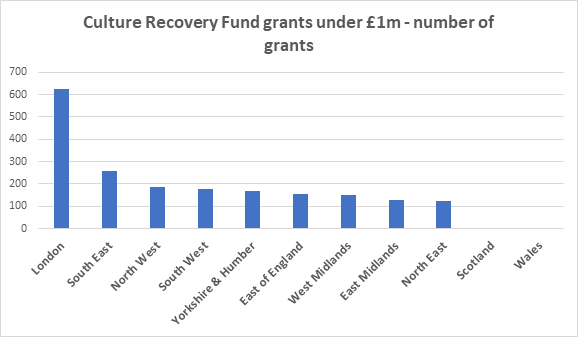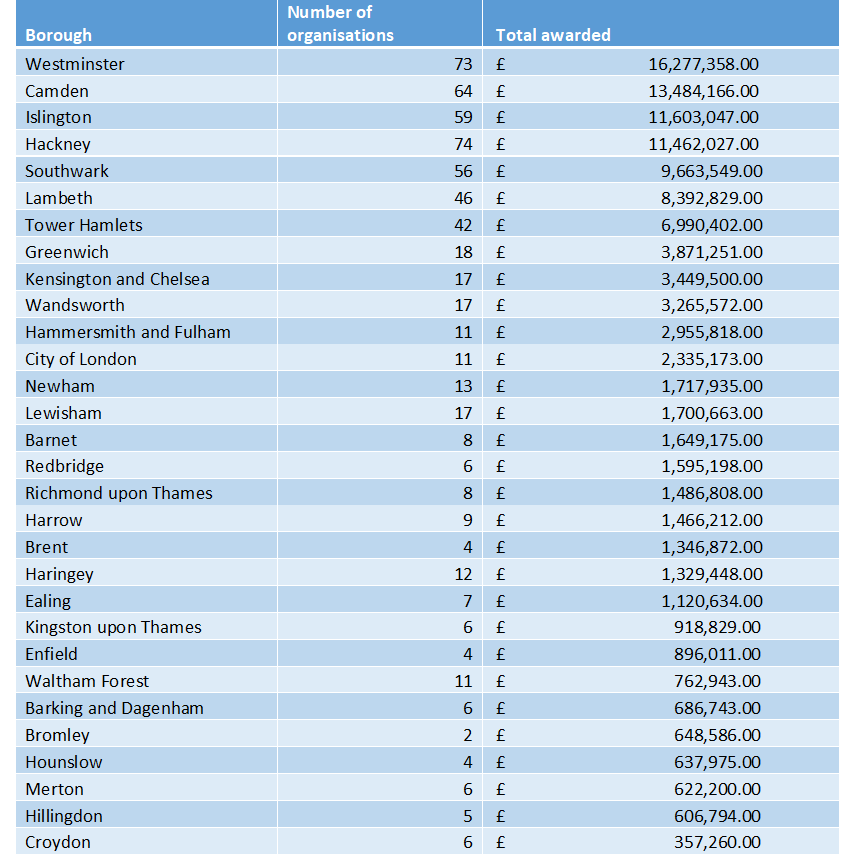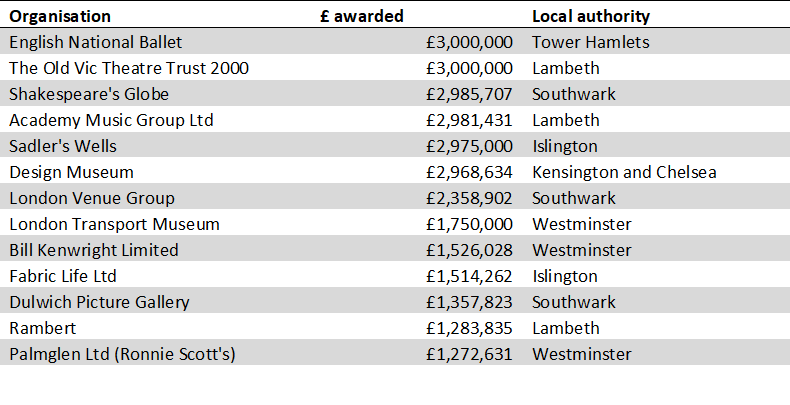Initial support for the culture sector
The arts and culture sector could access some of the generic support measures announced by the government at the beginning of the first lockdown period, including the Job Retention Scheme, the self-employment income support scheme and business rates holidays. However, concerns were raised at the time about businesses and people falling through the gaps in this support, for example artists working in shared studios who didn’t benefit from business rates holidays.
An initial £160 million emergency response package was provided by Arts Council England (ACE). £90 million of this was for ACE’s National Portfolio Organisations (NPOs), with £50 million available for organisations not in receipt of regular funding from the Arts Council and £20 million available to individuals. 33 per cent of the total amount of funding for non-NPO awards went to organisations or individuals in London. Additional support was also made available for the sector in London, including:
- The GLA announced a £2.3 million Culture at Risk Business Support Fund to help grassroots music and LGBTQ+ venues, independent cinemas and affordable creative workspace businesses which were not covered by government support and were at imminent risk of closure.
- The London Community Response Fund, coordinated by London Funders, was a £10 million fund offering grants of up to £50,000 including for community focused arts and culture, voluntary and civic organisations.
Culture Recovery Fund
On 5 July 2020, the government announced a £1.57 billion rescue package for the UK’s arts, culture and heritage industries. The measures included:
- £1.15 billion of support for cultural organisations in England, made up of £270 million of repayable finance and £880 million in grants, administered by Arts Council England.
- £100 million of targeted support for the Culture Recovery Fund for Heritage, administered by the National Lottery Heritage Fund. So far 162 heritage organisations have received £14 million worth of funding. Eight of these organisations are based in London and received a total of £2.2 million, most of which was awarded to St Paul’s Cathedral.
- £120 million capital investment to restart construction on cultural infrastructure and for heritage construction projects in England which were paused due to the coronavirus pandemic.
- The new funding will also mean an extra £188 million for the devolved administrations in Northern Ireland (£33 million), Scotland (£97 million) and Wales (£59 million).
- The Culture Recovery Fund’s Grants programme, administered by ACE, is targeted at cultural organisations that were financially stable before Covid-19 but were at imminent risk of failure.
- There were two rounds of funding for organisations applying for less than £1 million, both of which have now been announced. In total 1,974 grants were awarded, at a total amount of £334 million.
London’s share – Rounds 1 and 2 for grants under £1 million
627 organisations in London received funding (32 percent of the total) amounting to more than £114 million (34 per cent of the total).
627 organisations in London received funding (32 percent of the total) amounting to more than £114 million (34 per cent of the total).
Culture Recovery Fund data by local authority - Rounds 1 and 2 for grants under £1 million
The following chart lists the number of grants and total amount received by organisations in each London borough.
The following chart lists the number of grants and total amount received by organisations in each London borough.
An average of 19 organisations per borough received grants, with an average total of £3.4 million per borough. The median was 9 organisations and £1.5m.
Every London borough received at least one award. Organisations based in Hackney received the most (74) while organisations based in Havering received the least (1).
Culture Recovery Fund – Grants over £1 million Rounds 1 and 2
There were a further two rounds of funding for organisations applying for grants of over £1 million. 43 awards were made across the country, adding up to £94m. 13 of those were in London (30 percent of the total), receiving £29m combined (31 percent of the total).



